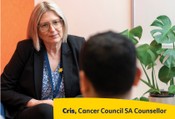This National Advance Care Planning Week, we encourage compassionate conversations between families and loved ones around end of life. We spoke to our experienced Counsellors, PJ and Cris, about why preparing for end of life is important and some simple steps people can take to prepare for end of life.
People’s reactions to end of life can be varied and complex. It is a personal and unique experience to everyone, and it is important to respect the way others choose to approach this time.
For many people, death and dying is a taboo subject that simply isn’t talked about. Many people—both those who are dying and their family and friends—find these conversations scary and uncomfortable. Yet, they can be beneficial in helping loved ones to cope through the distress, uncertainty, and finality of death and to communicate key wishes.
End of life planning can help with the experience of a ‘good’ death which reflects what matters to us. It can give us the chance to consider leaving a positive legacy that fits with how we want to be remembered, and having our lives celebrated and remembered the way we choose.
Here are 5 steps you can take to plan for end of life:
1. Put your choices in writing.
We recommend that anyone facing end of life due to cancer consider (if they are well enough) planning what happens to them, from making a Will to talking about their wishes. ‘Getting your affairs in order’ early, when you have the energy, leaves you free to focus on other matters such as being with family and doing things you enjoy.
There are a few arrangements you can make that can ease your mind and increase your sense of control while also reducing stress or even conflict for those closest to you after you’re gone:
- Review your Will—If you don’t have a Will, or you haven’t reviewed it recently, think about doing that now.
- Appoint an Enduring Power of Attorney—An Enduring Power of Attorney makes decisions about your future finances and legal matters.
- Document your wishes—An Advanced Care Plan is a legally binding document which can help foster discussion with family and loved ones about your end of life health care goals and wishes. It ensures your preferences are respected, and you can nominate others to make decisions for you.
2. Have conversations with loved ones so they understand your wishes and you understand theirs.
Priorities can change a lot as we approach end of life. Often our relationships are what matter most to us in our last stage. Consider what matters most to you and what you want to achieve. It could be showing gratitude to loved ones, resolving conflict, or going on a holiday. Maybe it’s being surrounded by family and friends, or spending private, quiet time with a few special people.
There may be days when you feel like talking about approaching the end of life, and days when you don’t—and that’s normal. In general, sharing how you think and feel with people you trust can help support all of you through the sadness, anxiety, and uncertainty.
3. Consider the emotional and practical supports available to you.
There are a range of services that can support you with any emotional, practical and spiritual concerns when approaching end of life.
- What is palliative care? Palliative care is often misunderstood as being solely about end of life, so some people are alarmed or confronted by engaging this team. But palliative care aims to improve your quality of life, manage your symptoms, provide resources such as equipment to aid care at home, and support your family through the process of managing a terminal illness in whatever time is left to you and after your death. Speak to your GP or specialist about your palliative care options and to get a referral.
- Emotional support and counselling services—All Cancer Council SA Nurses and Counsellors are experienced in talking about difficult topics. Because we are not friends or family, people feel free to explore the issues that are really worrying them, and find ways to cope with feelings, thoughts and practical matters.
- Financial and legal services—If you need to make a Will or access financial information, you can contact Cancer Council 13 11 20 to find out if you’re eligible for practical assistance and how to go about it.
4. Prepare your send off.
Share what you want your funeral or memorial to look like so your life can be celebrated and remembered in line with your wishes. While it might be difficult for you, it will reduce the stress for your family at an emotional time. It can be meaningful, cathartic and even uplifting to look over significant achievements, relationships, and events.
5. Say goodbye.
Knowing you will die offers you a special opportunity to say goodbye to those you love and care about. It is a sad and difficult thing to do, but for some people, the chance to consciously farewell others, is very precious for all involved.
Saying goodbye is a personal experience—you need to do what is right for you. You might set aside time to talk to each person individually or have a gathering for friends and family. You could create a memory box of keepsakes for your family, prepare letters or video and oral recordings to be given on birthdays and other milestones. You might want to enlist the help of others to make this happen or do so privately.
Caring for someone with cancer who is approaching end of life can also be stressful. It is common to feel like you don’t know what to do, what to say and how to cope. It is important to look after yourself during this time by taking breaks and maintaining your routine including eating well, getting enough sleep and exercising. If you are finding it hard to cope, it can help to have someone to talk to like a friend, someone in a similar position who understands, or a health professional.
Cancer Council SA offers free face to face, online or over the phone counselling sessions to South Australians and their loved ones impacted by cancer. For more information or to organise an appointment contact Cancer Council on 13 11 20 or visit our website at cancersa.org.au/support/support-services/counselling.
For more information about planning for end of life, Cancer Council SA has a range of helpful resources:
- Facing End of Life—A guide for people dying with cancer, their families and friends.
- Understanding Palliative Care—A guide for people with cancer, their families and friends.
- Understanding Grief—A guide for family and friends when someone has died from cancer.

